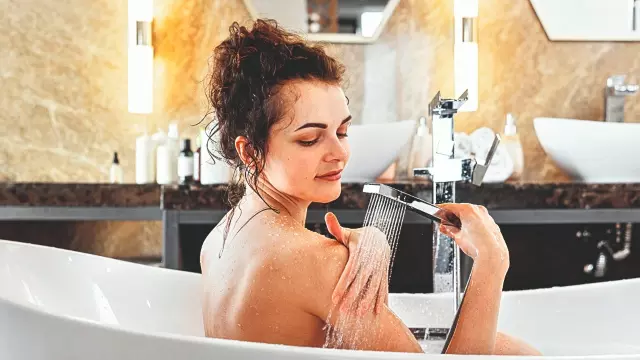Bathing Essentials
Bathing habits could be shaped by external factors from work-life to lifestyle choices, experts shower some advice

Bathing is a ritual. For some, it can be therapeutic and for others, an unwarranted futile exercise (Image Credit: DC)
Bathing is a ritual. For some, it can be therapeutic and for others, an unwarranted futile exercise. Many people jump under the shower every time they’re back home, while some choose to keep water at an arm’s length! People have preferences for their bathing time (morning or night) and types of bath (quick, long and relaxed shower). The permutations and combinations of bathing rituals are endless.
“Bathing practices are shaped by a lot, from genetics to culture to geography, psychology and lifestyle,” says Dr Shubham Chaudhary, MBBS. Dr Shubham opines that habits are developed due to a process of reinforcement that sticks with individuals.
Cleanliness = Godliness
Bathing in India is considered not just an act of cleaning oneself, but has its roots deeply connected to cultural practices. Even before the advent of soaps, people used cleansing agents like besan, turmeric, neem, reetha and soaps or various herbs to get themselves cleaned. However, with time, bathing practices have been influenced by lifestyle tweaks, work-related pressures and family-induced responsibilities. Dr Shubham says, “Some people have a greater inclination for habitual bathing, especially those with obsessive tendencies or differences in sensory processing.”
Work-Induced Patterns
Dr Shubham explains that work profiles can influence one's bathing habits. He shares that those individuals working in physically demanding jobs, such as drivers, athletes or even doctors, may want to have a bath at regular intervals. Such individuals may engage more with showers due to sweating, bacterial exposure or simply due to feelings of exhaustion.
Dr Shubham opines that those in the corporate ecosystem may choose to have a bath in the morning, especially to feel fresh and alive to kickstart meetings.
He says, “From a neuroscience perspective, showers in the morning will increase norepinephrine and dopamine, stimulating alertness.” Implying that showers at night have a positive impact on the parasympathetic nervous system. In other words, they serve as a lullaby to put you to sleep!
Day or Night
Whether you choose to have a dip as you wake up or before you hit the bed. There would be external considerations that shape such habits. Dr Tanaya Narendra, MBBS, MSc (Oxon) says, “It’s an individual choice. I don’t think this has much to do with a personality type.” One may have responsibilities to adhere to at different points and times in the day. She says, “If you have kids or have other dependents, you may have to cater to their needs in the morning and may not find enough time for yourself.”
Dr Shubham opines that morning showers differ from cool night showers. He says, “Morning showers activate the sympathetic nervous system, which enhances cortisol levels and wakefulness”. However, the night ones aren’t any bad either. Taking a shower in the evening, particularly a warm bath can also spur melatonin secretions. In other words, gives you a sound sleep.
Bathing Effect
Whether you like using your traditional bucket and mug or just enjoy water frizzing down your head under a shower. Be assured, that bathing in general can help induce a feeling of calmness.
Dr Tanaya explains how bathing paves the way for relaxation. She says, “There are times when we just want to be with ourselves and our thoughts, bathing could help us feel relaxed at such times”. Dr Shubham says, “From a neuroscientific perspective, immersion into water itself can produce a mild altered consciousness state- similar to how you feel when in meditation”. What adds to this feeling of calmness could be warm baths, which reduce cortisol (decrease stress) and give a boost to the vagal tone. The vagal nerve is associated with relaxation.
A Mixed Bag
It is important to know that no matter what your bathing preference is. There are neurophysiological reasons that make you follow one style as opposed to the other. For instance, routine-oriented or disciplined personalities or high-performing professionals would stick to fixed time slots for bathing, vis-à-vis creative individuals. Dr Shubham says, “Creativity could get people into being night owls who may have a more fluid approach to bathing.”
Bathing could mean different things to different people. It’s not just about hygiene, but mindsets and conditioning and so much more.
( Source : Deccan Chronicle )
Next Story
